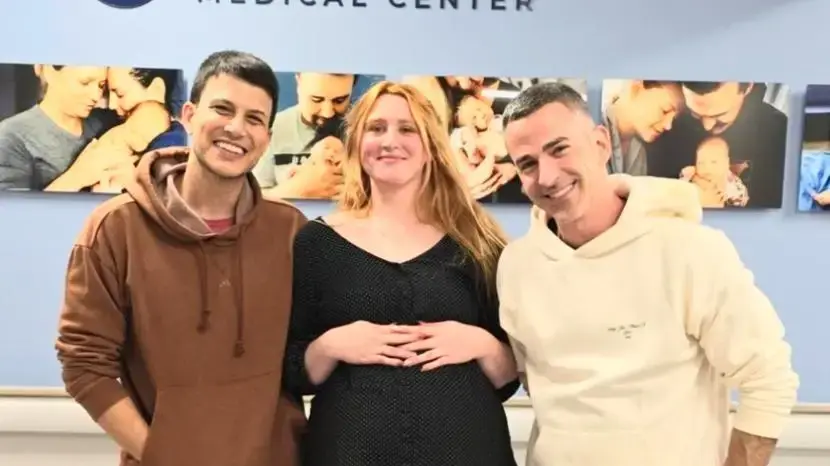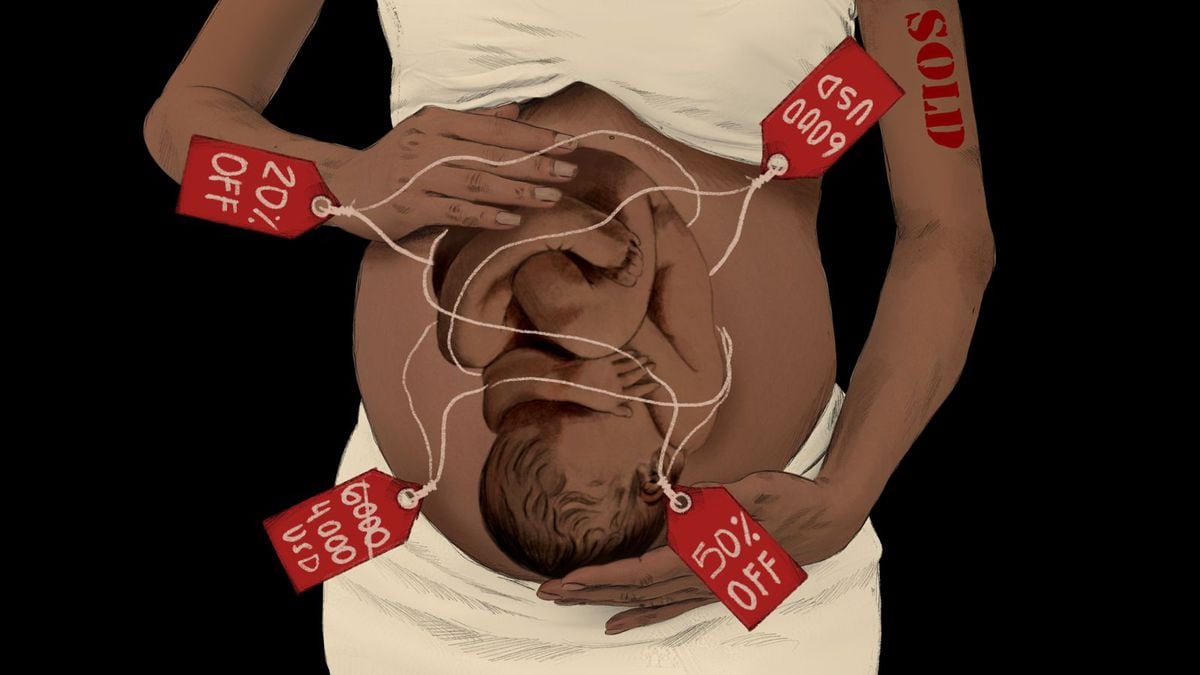Global society
all articles
Anastasia Ontou gave birth to three children in her life. Her daughter Konstantina, when she was 23 years old. Her son Labros, four years later. And her granddaughter Maria Anastasia, at 67.
A summer day in Larisa, by car 355 kilometers north of Athens: Maria Anastasia has just whizzed through the living room, past the golden sofa and the golden and white wallpaper. The two and a half year old is now tired on her grandmother's lap. The little feet in the shoes decorated with pink mesh hover in the air, the red hair band sits a little crooked. Then she falls asleep in Anastasia's sun-tanned arms. Minutes later, her mom Konstantina carries her into the little room, where an army of pink soft toys is waiting for her.
Maria Anastasia got her first name from the Holy Virgin, to whom her mother Konstantina, 46, prayed for her existence for years. The second from her grandmother, who made the miracle possible. There is a saying in Greece: "My child's child is twice my child." Grandparents, it says, would do anything for their grandchild. For a few, this may be as true as for Anastasia.
Maria Feck
Anastasia Ontou, 70, delivered the fertilized egg of her daughter Konstantina, 46
While surrogacy is prohibited in countries such as Switzerland, Germany or Austria, it is legally clearly regulated in Greece, anchored in family law, in Article 1458 of the Civil Code. It has tradition among family members. Sisters, cousins, mothers can give birth to their infertile relatives there - as in the case of the Ontous.
Konstantina is 37 years old when she tries two artificial inseminations, both unsuccessfully. Five years ago she and her partner had already tried to have a child naturally. A new doctor is performing five more artificial inseminations in just seven months. She never gets pregnant, but she loses more and more blood during the period. Your body is exhausted from permanent hormone intake.
At 42, she heard from Dr. Pantos, an experienced fertility doctor in Athens. The fibroid that he discovers is small, but sits like a spiral, making pregnancy impossible. And worse: Konstantina has cancer. Dr. Pantos needs to remove her uterus. Because of Konstantina's age and illness, adoption is almost hopeless. There is only one solution for having your own child: surrogacy. Like many others, she is at the end of a long suffering.
Maria Feck
Medic Konstantinos Pantos
If a woman is under 50 and cannot naturally have children, she is allowed to hire a surrogate mother in Greece. Before the pregnancy begins, a court order stipulates that the mother of choice is the mother - and not the woman who is carrying the child. If the applicant does not have an egg of her own, that of a third woman can be used.
Before the uterus was removed, Konstantina had six embryos - her eggs fertilized with her husband's semen - frozen. Through acquaintances, she finds three women who could carry them out: two Greeks and one Albanian.
Although the law does not allow women to charge a fee, they charge between 30,000 and 50,000 euros. Then Konstantina's mother Anastasia says: "I can be the surrogate mother." The daughter thinks: her age! The son-in-law: her health! But Dr. Pantos says: "In theory it is possible." Because it is not the age of the uterus that is important, but that of the egg.
Maria Feck
Dr. Genesis Clinic Konstantinos Pantos in Athens
"Genesis Athens Clinic" called Konstantinos Pantos, 62, his practice, which is not far from Kifisias Avenue, a busy street in the greater Athens area. On a Thursday morning, busy staff rushed past patient patients. Now and then a doctor in shirt and jeans: pantos. In 2002, when the law on artificial insemination was passed, he founded the clinic and two years later it went into operation. "We have had over 40,000 babies since then," he says. Each one using artificial insemination.
The many baby photos on the walls tell of this. And small and large images of saints, which are spread all over the clinic. Pantos' office is like a chapel, but he is not particularly religious. "They are gifts from hoping couples and grateful parents," he says. The recession that has shaped Greece's economy in recent years has not hit the Genesis Athens Clinic. In 2010 she had 35 employees, now there are 125. The number of interventions is also increasing: 6,673 in vitro fertilization cycles in 2018 alone. A third of these are babies today.
"Every woman, whether with or without a man, has the right to have their own child," says Pantos, himself the father of eight children. "As long as the ethical and legal conditions are in place." He is honored by his patients for exhausting these conditions to their limits.
Maria Feck
Baby photos of former patients on the walls in the Genesis clinic by Konstantinos Pantos
After choosing Anastasia, Constantine's mother, as surrogate mother, she has to put her body and psyche through various tests for a year. She is healthy, biologically not older than 60 years. And only entered menopause at 58, so pantos can produce an artificial cycle with hormones.
In the first attempt, the doctors use three embryos. It does not work. You try the other three. One survived. Anastasia is pregnant, at 66. According to Pantos, she is the oldest surrogate mother in the world.
Every week she has to go to the doctor in Larisa, every few weeks to Pantos in Athens. Pregnancy runs smoothly at first, only tomatoes no longer taste Anastasia. You can hardly see her stomach because she is a strong woman.
Maria Feck
The hands of three generations: Anastasia Ontou with daughter Konstantina and granddaughter Maria Anastasia
In the 31st week, however, Pantos and his team worry about the parturients. Heart problems. You decide to fetch the baby by caesarean section. On December 20, 2016, Maria Anastasia was born at 7 a.m. in a private clinic in Athens. It weighs 1,200 grams and is 39 centimeters tall. The first to hold her in her arms is her mother Konstantina.
In some questions of family law, Greece could be described as rather conservative. Single parents are not allowed to adopt, marriage between homosexuals is prohibited. But the country has become a pioneer in medically assisted reproduction because it has created an advanced institutional framework that is clearly regulated.
Dimitra Papadopoulou-Klamaris, a professor at the Law Faculty of the University of Athens, was one of nine professors the Ministry of Justice commissioned in the early 2000s to draft a law regulating artificial insemination. The lawyers heard experts: biologists, doctors, sociologists, psychologists, representatives of the Orthodox Church, an ethics committee. For this they met every two weeks for fourteen months.
Maria Feck
Professor Dimitra Papadopoulou-Klamaris: "The altruistic idea was essential"
"In the discussions we decided to also create a legal framework for surrogacy," says Papadopoulou-Klamaris, who has been lecturing on the legal regulation of artificial insemination since the 1990s. Surrogacy was not previously regulated, but was occasionally practiced within families. For example, one woman carried the fertilized egg of her sterile sister, who the child had to adopt after birth.
The Greek parliament critically discussed surrogacy, says the lawyer. In spite of this, the MPs voted in the first attempt for Law 3089/2002. And three years later also for Law 3305/2005, which regulates, among other things, the rights and obligations of the IVF centers. In addition to the Pantos clinic, there are now around 60 across the country.
Initially, the law required Greek residence for both future parents and surrogate mother. Since 2014, it has only been mandatory for one of the parties involved. The procedure also enables foreign couples.
Maria Feck
Embryos in a test tube under the magnifying glass
The opening fits in with a development: Greece is increasingly becoming a destination for medical tourism, there is already a Greek Medical Tourism Council, and Pantos is also part of it. The country is popular for three reasons, he says: Because of the medical development, the comparatively low costs and the legal situation, which also makes egg donation or pre-implantation diagnostics possible .
Papadopoulou-Klamaris was not involved in the 2014 law change. She says: "The altruistic idea was essential for us in the legislative commission of 2001 - but it only applies to family members or close friends."
An investigation of the 173 surrogate motherhoods, which were approved by the Athens Court of First Instance between 2005 and 2015, shows that in 113 cases the surrogate mothers were not Greeks, but foreign nationals from Poland, Georgia and Bulgaria living in the country. 19 previously had an employment relationship with the applicant. 52 said they had friendly relationships. Only 39 of the cases concerned families like the Ontous.
Maria Feck
At the cot: grandma and granddaughter
In December 2016, Anastasia became the headline in Greek media. In the pictures that photographers take of her in the hospital bed, she looks older than she does today, and she already wears her gray hair for a short time. Their advanced age is also a point of contention in the medical community, which is why an age limit is introduced: surrogate mothers must not be younger than 25 and not older than 45 since then.
Anastasia is celebrated in her home village, and the mayor presents her with a certificate "In honor of the heroic grandmother". The neighbors give her the picture of an angel. "I would do it again and again for my family," says Anastasia. She not only fulfilled her daughter's greatest wish, but also herself: her first grandchild. "Childlessness means bad luck in Greece," says the lawyer Papadopoulou-Klamaris. So everything is often accepted to prevent this.
After giving birth, Grandma Anastasia recovers quickly and stays in the hospital for five days. The baby is in the incubator for two months. On February 20th, Mama Konstantina Maria can finally take Anastasia home. There, Grandma Anastasia holds the little one in her arms for the first time.
Maria Feck
Three generations
Nothing about her today reminds of the fragile creature from back then, Maria Anastasia is an active, healthy girl. A whirlwind that parrots everything he hears, says the mother and laughs. First of all, she recognizes her husband in her daughter. The two have the same almond-shaped eyes, the same white skin, the dark, straight hair.
Konstantina Maria Anastasia does not want to hide the fact that she did not give birth to her, but rather her grandma. But first she tells her about it in the form of a fairy tale: "Once there was a duck who wanted to get chicks, but it was not possible for her. So her mother helped her." Maria Anastasia likes to hear the story, preferably in the evening before going to bed.
This contribution is part of the Global Society project, for which our reporters report from four continents. The project is long-term and is supported by the Bill & Melinda Gates Foundation.
What is the Global Society project?
Reporters from Asia, Africa, Latin America and Europe will report under the title Global Society - about injustices in a globalized world, sociopolitical challenges and sustainable development. The reports, analyzes, photo series, videos and podcasts appear in the SPIEGEL policy department. The project is long-term and has been supported by the Bill & Melinda Gates Foundation (BMGF) for over three years.
Is the journalistic content independent of the foundation?
Yes. The editorial content is created by the Gates Foundation without influence.
Do other media have similar projects?
Yes. Major European media such as "The Guardian" and "El País" have developed similar sections with "Global Development" and "Planeta Futuro" on their news pages with the support of the Gates Foundation.
Have there already been similar projects at SPIEGEL ONLINE?
In recent years, SPIEGEL ONLINE has already implemented two projects with the European Journalism Center (EJC) and the support of the Bill & Melinda Gates Foundation: The "Expedition Tomorrow" about global sustainability goals and the journalistic refugee project "The New Arrivals" several award-winning multimedia reports on migration and flight have emerged.
Where can I find all publications on global society?
The pieces can be found at SPIEGEL ONLINE on the topic page Global Society.


/cloudfront-eu-central-1.images.arcpublishing.com/prisa/BEHGGQZBURDSZG3TTV3Y6ERJCU.jpg)





